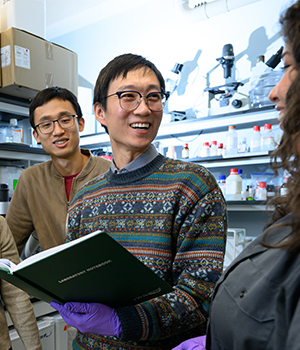
Ming Guo
(he/him)
Mechanical Engineering
Having vulnerable conversations
When Professor Ming Guo first set foot in Cambridge in 2007, fresh from earning his bachelor’s degree at Tsinghua University in China, he could hardly have imagined that he would one day become a professor at MIT.
Today, Guo is an Associate Professor in Mechanical Engineering, celebrated not only for his groundbreaking research but also for his exceptional mentorship of students. Guo’s group works at the interface of mechanics, physics, and cell biology, seeking to understand how physical properties and biological function affect each other in cellular systems.
Having vulnerable conversations
A key aspect of Guo’s mentorship style is his ability to foster an environment where students feel comfortable expressing their difficulties. He actively shows empathy for his students’ life outside of the lab, often reaching out to provide support during challenging times. When one nominator was faced with significant personal difficulties, Guo made a point to check in regularly, ensuring the student had a support network of friends and labmates.
Guo champions his students both academically and personally. For instance, when a collaborating lab placed unrealistic expectations on a student’s experimental output, Guo openly praised the student’s efforts and achievements in a joint meeting, alleviating pressure and highlighting the student’s hard work.
Lastly, Guo encourages vulnerable conversations about issues affecting students, such as political developments and racial inequities. During the graduate student union vote, he fostered open discussion, showing genuine interest in understanding the challenges faced by graduate students and using these insights to better support them.
Emphasizing learning over achievement
In Guo’s research group, learning and development are prioritized over achievements and goals. When students encounter challenges in their research, Guo helps them maintain perspective by validating their struggles and recognizing the skills they acquire through difficult experiments. By celebrating their progress and emphasizing the importance of the learning process, he ensures that students understand the value of their experiences beyond outcomes. This approach not only boosts their confidence but also fosters a deeper appreciation for the scientific process and their own development as researchers.
In addition to his supportive teaching style, Guo actively advises his students on the nuances of academia, including the significance of networking and maintaining collaborations. He connects
students with various labs and experts, offering them firsthand experience with academic cooperation. By sharing his personal stories of giving talks and collaborating on papers, Guo provides invaluable insights that help students understand the broader context of their work.
Guo shares that he feels most energized and happy when he talks to students. He looks forward to the new ideas that they present. One nominator commented on how much Guo enjoys giving feedback at group meetings. “Sometimes he isn’t convinced in the beginning, but he has cultivated our lab atmosphere to be conducive to extended discussion.” He continues, “When things do work and become really interesting, he is extremely excited with us and pushes us to share our own ideas with the wider research community.”
